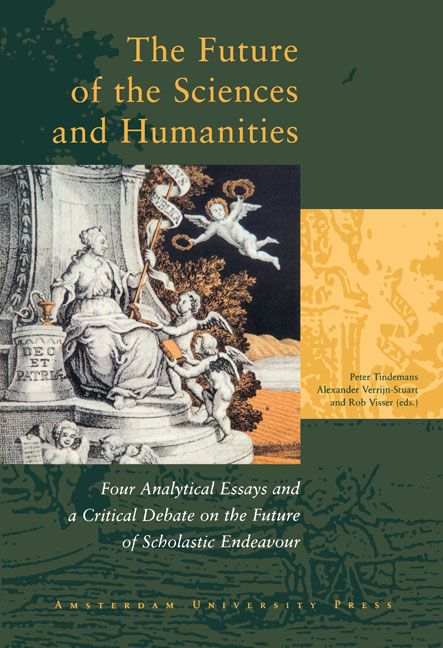 The Future of the Sciences and Humanities
The Future of the Sciences and Humanities Book contents
- Frontmatter
- Preface
- Contents
- 1 The Sciences and Arts Debate A review and some conclusions
- 2 Historical and Structural Approaches in the Natural and Human Sciences .
- The Role of Laws and Contingency in History
- 3 Science and Society in Flux
- Does A New Kind of Science Require a New Kind of Scholar or a New Kind of University?
- 4 Science for the 21st Century
- Redrawing Disciplinar Boundaries – but to What Degree?
- 5 Science and Democracy
- Science and Democracy: a Difficult Relationship: ‘An enlightened and elitist essay on an unresolvable problem’
- 6 Epilogue
- 7 Appendix
Preface
Published online by Cambridge University Press: 03 February 2021
- Frontmatter
- Preface
- Contents
- 1 The Sciences and Arts Debate A review and some conclusions
- 2 Historical and Structural Approaches in the Natural and Human Sciences .
- The Role of Laws and Contingency in History
- 3 Science and Society in Flux
- Does A New Kind of Science Require a New Kind of Scholar or a New Kind of University?
- 4 Science for the 21st Century
- Redrawing Disciplinar Boundaries – but to What Degree?
- 5 Science and Democracy
- Science and Democracy: a Difficult Relationship: ‘An enlightened and elitist essay on an unresolvable problem’
- 6 Epilogue
- 7 Appendix
Summary
Ghosts of Plato and Aristotle, of Descartes, Newton, Kant and Wittgenstein speak to us, benevolent and admonishing. About natural sciences, liberal arts, the humanities and philosophy. Reminding us of our cultural heritage and social history. So what of the future?
The sciences and humanities evolve in two different and not always easily reconcilable ways: by specialisation and broadening of their scopes. Those dedicated to specialisation often accuse the ‘broadeners’ of fundamental shallowness. However, in many instances, innovation results from unusual combinations of views and techniques originating in widely different domains. The essential breakthrough usually consists in the recognition and solution of some (‘deep’) integration problem. From time to time, a new area emerges and takes on a life of its own, as a truly independent discipline.
In the 21st century, both approaches will continue to be productive. Unfortunately, ‘broadening’ research may be hampered by ‘traditional’ views and too rigid a set-up of research regimes. Among other things, one may rightly question the customary distinction: humanities, natural sciences, social sciences (sometimes referred to as the alpha, beta and gamma disciplines). Such strictly compartmentalized nomenclature will always lead to confusion in cases of more detailed interdisciplinary research. Irrespective of the names associated with emerging disciplines, the organizational links with established institutions may well have to differ radically from current arrangements.
New departures require new views. That applies to research approaches in general and to governmental and institutional policies in particular. All need open dialogues and critical self-assessment. In this connection, the way we talk about arts and sciences has become of increasing importance.
The four essays in this book present a variety of illuminating and refreshing points of view on the problems in question. Many angles were further developed in the Sciences and Arts Debate held by the Hollandsche Maatschappij der Wetenschappen (“Holland Society of Arts and Sciences”) on 16th February 2002, triggered by the presentations of the authors and the reviews by the invited discussants. The editors of this volume discuss the conclusions (and highlights) in the first chapter and add a summary in an epilogue. While not overly important as such, one must admit that the traditional “Arts and Sciences” in the Society's name and in the title of the symposium may have constituted an appropriate label for 18th century practices, but today are more properly covered by “Sciences and Humanities”!
- Type
- Chapter
- Information
- The Future of the Sciences and HumanitiesFour Analytical Essays and a Critical Debate on the Future of Scholastic Endeavor, pp. 5 - 6Publisher: Amsterdam University PressPrint publication year: 2002


